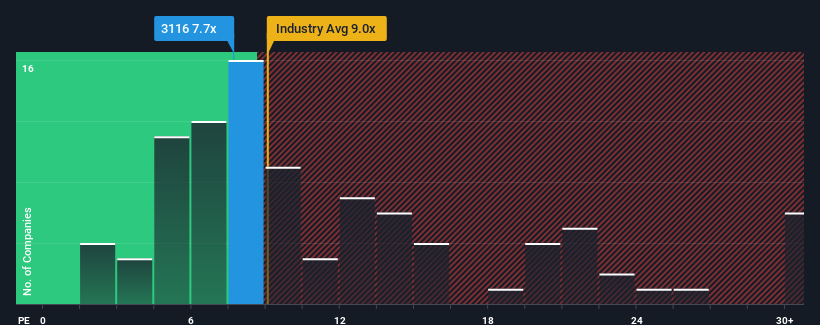- Japan
- /
- Auto Components
- /
- TSE:3116
The Market Doesn't Like What It Sees From Toyota Boshoku Corporation's (TSE:3116) Earnings Yet
With a price-to-earnings (or "P/E") ratio of 7.7x Toyota Boshoku Corporation (TSE:3116) may be sending bullish signals at the moment, given that almost half of all companies in Japan have P/E ratios greater than 13x and even P/E's higher than 20x are not unusual. Although, it's not wise to just take the P/E at face value as there may be an explanation why it's limited.
We've discovered 1 warning sign about Toyota Boshoku. View them for free.Toyota Boshoku hasn't been tracking well recently as its declining earnings compare poorly to other companies, which have seen some growth on average. The P/E is probably low because investors think this poor earnings performance isn't going to get any better. If you still like the company, you'd be hoping this isn't the case so that you could potentially pick up some stock while it's out of favour.
Check out our latest analysis for Toyota Boshoku

How Is Toyota Boshoku's Growth Trending?
There's an inherent assumption that a company should underperform the market for P/E ratios like Toyota Boshoku's to be considered reasonable.
Retrospectively, the last year delivered a frustrating 4.5% decrease to the company's bottom line. This has soured the latest three-year period, which nevertheless managed to deliver a decent 6.6% overall rise in EPS. Accordingly, while they would have preferred to keep the run going, shareholders would be roughly satisfied with the medium-term rates of earnings growth.
Shifting to the future, estimates from the six analysts covering the company suggest earnings should grow by 2.5% over the next year. Meanwhile, the rest of the market is forecast to expand by 9.7%, which is noticeably more attractive.
With this information, we can see why Toyota Boshoku is trading at a P/E lower than the market. Apparently many shareholders weren't comfortable holding on while the company is potentially eyeing a less prosperous future.
What We Can Learn From Toyota Boshoku's P/E?
Typically, we'd caution against reading too much into price-to-earnings ratios when settling on investment decisions, though it can reveal plenty about what other market participants think about the company.
We've established that Toyota Boshoku maintains its low P/E on the weakness of its forecast growth being lower than the wider market, as expected. Right now shareholders are accepting the low P/E as they concede future earnings probably won't provide any pleasant surprises. It's hard to see the share price rising strongly in the near future under these circumstances.
Before you take the next step, you should know about the 1 warning sign for Toyota Boshoku that we have uncovered.
Of course, you might also be able to find a better stock than Toyota Boshoku. So you may wish to see this free collection of other companies that have reasonable P/E ratios and have grown earnings strongly.
Valuation is complex, but we're here to simplify it.
Discover if Toyota Boshoku might be undervalued or overvalued with our detailed analysis, featuring fair value estimates, potential risks, dividends, insider trades, and its financial condition.
Access Free AnalysisHave feedback on this article? Concerned about the content? Get in touch with us directly. Alternatively, email editorial-team (at) simplywallst.com.
This article by Simply Wall St is general in nature. We provide commentary based on historical data and analyst forecasts only using an unbiased methodology and our articles are not intended to be financial advice. It does not constitute a recommendation to buy or sell any stock, and does not take account of your objectives, or your financial situation. We aim to bring you long-term focused analysis driven by fundamental data. Note that our analysis may not factor in the latest price-sensitive company announcements or qualitative material. Simply Wall St has no position in any stocks mentioned.
About TSE:3116
Toyota Boshoku
Develops, manufactures, and sells automotive interior systems in Japan, the United States, China, and internationally.
Flawless balance sheet established dividend payer.
Similar Companies
Market Insights
Community Narratives




